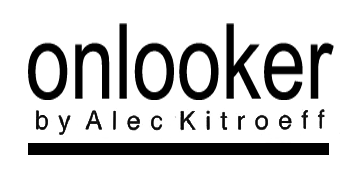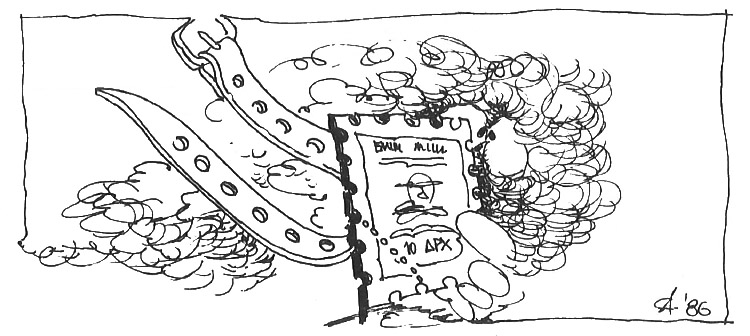
Also, some of the changes have been quite paradoxical, such as the prime minister’s attire. Before the 1981 elections he appeared in public as a sporty, swinging socialist, with open-necked shirt and sweater when everyone else wore a coat and tie. Today he goes around looking like a Belgian banker, while his entire administration could be mistaken for a bunch of soccer fans on their way to Panathinaikos Stadium.
Ladies’ wear has also changed. Chic matrons can still be seen in tailored suits in the Kolonaki perimeter, but the younger set makes a determined effort to look as sloppy as possible with shapeless blouses and baggy bloomers, or jeans that are so tight they make a good substitute for girdles. As for the kids, they kiss goodbye to shoe leather with their booties, and henceforth encase their feet and ankles in laced-up sneakers with fancy names which are worn constantly until late puberty, when they have to be removed by an orthopedist wearing a gas mask.

There have been changes in the eating scene, too. In 1981 there were few places other than the traditional taverna or fancy restaurants that could give you acid indigestion. Today you can take your pick from everything under the sun, ranging from Chinese to Serbo-Croatian. Indeed, while chatting with Yannis Horn the other day, he suggested it was time to start a Chinese language daily now that the number of Chinese cooks in the greater Athens Piraeus area is probably as large as the English-speaking population was when he first launched the Athens News 35 years ago.
And talking of newspapers, there have been marked changes in the Greek press. Color has come to liven the pages of the dailies, most of which have changed from broadsheet to tabloid form, with foot-high headlines. However, the great traditions of Greek journalism, such as slipshod reporting and general inaccuracy, have been carefully preserved.
On the economic scene, although the PASOK government has been urging the people to tighten their belts, the only constriction that seems to have taken place is with the seat belts of cars. Wearing them has been made compulsory by law, and this has been instrumental in saving the lives of countless crash victims who have gone through red lights. The government is now planning to introduce a new law making it compulsory to stop when the light turns red.
The reason why people have been asked to tighten their belts is that most of the country’s factories were closed down when it was discovered that instead of using their bank loans to pay industrial fines and retroactive taxes, the industrialists have been using them to set up boutiques for their mistresses, buy 101-foot cabin cruisers or invest in choice property in Politeia or on Lac Le man. Since nothing is being produced locally, the government is having to borrow money abroad to pay for essential imports, such as 12-year-old Chivas Regal, Kellogg’s Rice Krispies, smoked salmon from Scotland and Godiva chocolates. As a result, the foreign debt has become unmanageable, and some of the country’s more enthusiastic socialists are very pleased to see us in the same boat as some of the Third World countries they admire so much.
In spite of everything, however, Greece is still a member of NATO, although we have not taken part in NATO exercises for a long time now. The excuse is our row with Turkey, but the real reason is the high cost of gasoline at 77 drachmas per litre and the fact that the only serviceable army helicopters are being used to ferry generals and other officials to and from the Pentagon in Holargos.
Also, the PASOK Party line, which was vehemently anti-EEC before 1981, turned volte-face when it became apparent that the community was a valuable source of income and membership brought a veritable bonanza of shuttling between Western capitals at government expense.
Another great change took place a couple of years ago when the city police was merged with the provincial gendarmerie. Both bodies exchanged their grey and grey-green uniforms for NYPD blue, and to make sure nobody would get the idea the streets of Greek cities were being patrolled by New York cops, the force was named Elliniki, or Greek Police. Motorists were relieved to find, though, that the merger did not affect the extraordinary ability of traffic cops to blow their whistles at half-second intervals continuously from seven in the morning to eight at night.
Finally, although PASOK is eager to reform many sectors of Greek life, it has stopped short of tampering with some aspects of it which are so much a part of the social fabric it would cause complete disorientation among the public if they were eliminated. I am referring to the nefos, or smog, which, apart from being an excuse to keep half the cars out of the city center, is also a valuable landmark, visible to airline pilots from a hundred miles away; to the interminable commercials on television which allow viewers to take a three-course meal between the announced time of a show and its actual start; to the lines at the windows of bank tellers who, in spite of their electronic equipment, are still given enough paperwork to justify their existence; and , last but not least, to the almighty hartosimo, or excise stamp, which you are still sent out to buy at the kiosk on the street corner after you have spent a whole morning trying to clear through customs the small package of chocolate chip cookies your favorite aunt from Philadelphia sent you for your birthday.







